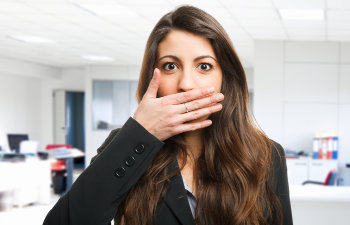
One out of four people around the globe suffer from halitosis, more commonly referred to as “bad breath.” Halitosis can impact your self-confidence, your relationships and even your career if you have a job that requires in-person conversations and meetings. Don’t let the odor of your mouth sabotage your first impression.
Modern Dental & Implants proudly offers halitosis treatment to patients in Lodi. While bad breath is common and can certainly be embarrassing, it can also be an indication that your oral health needs attention. When it comes to effectively eliminating bad breath, our dentists are here to tell you what’s true and what’s false.
What is Halitosis?
Halitosis, commonly known as bad breath, refers to an unpleasant odor that originates from the mouth. It is a condition characterized by an offensive smell that is noticeable when a person exhales. Halitosis can be a temporary issue caused by certain foods, poor oral hygiene, or other factors, or it can be a chronic problem that persists despite proper dental care.
Myths about Treating Bad Breath
There are several myths and misconceptions about treating bad breath. Let’s debunk some of the common myths:
- Mouthwash alone can cure bad breath: While mouthwash can provide temporary relief by masking bad breath, it does not address the underlying cause. Mouthwash may help reduce bacteria in the mouth, but it is not a long-term solution. Proper oral hygiene, including brushing, flossing, and tongue cleaning, is essential for addressing the root cause of bad breath.
- Chewing gum or mints eliminate bad breath: Chewing gum or sucking on mints can temporarily freshen breath by increasing saliva flow and masking odor. However, they are not a cure for bad breath. They only provide temporary relief and do not address the underlying cause. It’s important to focus on improving oral hygiene practices and identifying and treating any oral health issues.
- Brushing your teeth harder eliminates bad breath: Brushing your teeth vigorously or aggressively does not eliminate bad breath. In fact, it can damage the gums and tooth enamel. The key to effective brushing is using a soft-bristled toothbrush and employing proper technique, such as brushing for two minutes twice a day, covering all tooth surfaces, and paying attention to the gumline and tongue.
- Breath mints and mouthwash are interchangeable: While both breath mints and mouthwash can provide temporary relief from bad breath, they work differently. Mouthwash is designed to kill bacteria and freshen the mouth, while mints primarily mask the odor. Mouthwash reaches areas of the mouth that mints cannot, making it more effective in reducing bacteria and improving oral hygiene.
- Bad breath originates only from the mouth: While the majority of cases of bad breath originate from the mouth, it can also be a symptom of underlying medical conditions such as respiratory infections, sinusitis, gastrointestinal issues, or systemic diseases. It’s essential to consult a healthcare professional if bad breath persists despite maintaining good oral hygiene.
Remember, the most effective way to combat bad breath is through consistent and proper oral hygiene practices, along with regular dental check-ups.
The Importance of Addressing the Cause of Bad Breath
The truth is, you can only effectively treat halitosis if you first learn its cause. At Modern Dental & Implants, we understand the importance of diagnosing the root cause of bad breath, as this will guide your treatment plan for lasting relief.
The most common cause of bad breath is bacteria that reside in the mouth. These bacteria break down food particles, saliva, and other debris, releasing volatile sulfur compounds that contribute to the foul odor. Other potential causes of persistent halitosis include:
- Poor oral hygiene: Inadequate brushing, flossing, and tongue cleaning can allow bacteria to multiply and produce odorous compounds.
- Dry mouth: Reduced saliva production can lead to a dry mouth, allowing bacteria to proliferate and cause bad breath. Dry mouth can be caused by medications, breathing through the mouth, or certain medical conditions.
- Gum disease: Inflammation and infection of the gums (gingivitis or periodontitis) can result in persistent bad breath due to the presence of bacteria in the oral cavity.
- Tobacco use: Smoking or chewing tobacco can lead to chronic bad breath, as well as other oral health problems.
- Medical conditions: Some underlying medical conditions, such as respiratory infections, sinusitis, gastrointestinal disorders, liver or kidney problems, and diabetes, can contribute to halitosis.
By choosing Modern Dental & Implants to cure your halitosis, we will determine the underlying cause of your bad breath before determining an appropriate treatment. Call our Lodi dental clinic today to learn more about how you can achieve fresher breath and a more confident smile.
Posted on behalf of
601 W Kettleman Ln
Lodi, CA 95240
Phone: Call (209) 427-1533
Email: contact@moderndentalhealth.com
Monday – Friday 8:00 AM – 5:00 PM
Saturday By Appointment Only
